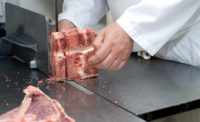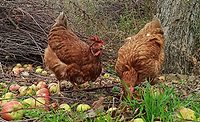A new study released by Pew Charitable Trusts, entitled “Food Safety from Farm to Fork”, has determined a few ways to prevent meat from becoming contaminated while on the farm. According to a statement, Pew believes that “wider use of evidence-based food safety interventions on farms and feedlots would significantly reduce the risk of people getting sick from contaminated meat and poultry”.
“An effective food safety system includes measures to prevent contamination at every step along the meat and poultry supply chain. More can and should be done on farms and feedlots,” says Sandra Eskin, Pew’s director of the safe food project.
Pew’s suggested contamination prevention methods include:
- Meat producers incorporating “pre-harvest intentions” (ie. ensuring that water and feed are clean; administering vaccines and other preventive treatments) for poultry, cattle and swine in their health management programs.
- Meat and poultry facilities should be armed with sufficient levels of biosecurity, along with improved pathogen eradication programs.
- Agencies that provide funding should invest in monies geared toward best practices, field trials and vaccination research.
- Federal bodies should begin offering incentives for facilities that implement successful intervention strategies.
Overall, the report dissects various ways that foodborne illnesses such as Salmonella and Escherichia coli could be prevented at the farm level. Pew cites that contaminated meat and poultry products are responsible for an estimated 2 million illnesses in the U.S. each year.
Sign up for Food Safety Magazine’s bi-weekly emails!
Subscribe to our new podcast: Food Safety Matters!




